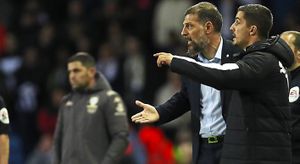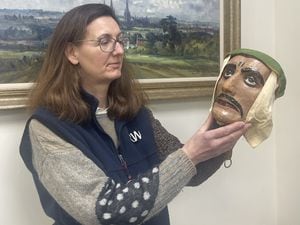Danilo Butorovic: Slaven Bilic’s coach from the next generation
He has been described by Slaven Bilic as a coach from the next generation – someone who has great ideas and excels at analysis.

Assistant boss Danilo Butorovic may only be 35 years old, but he is integral to the impressive start Albion have made to the new season.
Part of a management team that also includes Dean Racunica and Julian Dicks, Butorovic’s journey to The Hawthorns has been a remarkable one.
A speedy winger as a teenager: “I had lots of pace but I wasn’t that good with the ball,” was how the Croatian described his own playing style.
When he was just 14 years old, though, Butorovic started to become fascinated with the coaching side of the game.
And when he then had a bike accident, he decided his future lay in the dugout instead of on the pitch.
“I played until I was 17,” Butorovic said. “I was thinking about whether I should continue or not – I didn’t want to play for lower league teams.
“I just thought if I’m not good enough, I’d better stop and go to college.
“Then I had a small accident. I fell off a bike and it stopped me for a couple of months. Then I just thought – that’s it. Call it a day and go to college.
“To be honest, I wanted to be a coach since I was 14.
“It’s something that might be quite strange, but it’s what I’ve wanted to do since I was a kid.”
Butorovic, who now holds a UEFA Pro licence, began studying for his coaching badges with the Croatian FA.
An expert in data analysis and computer programmes, he graduated top of his class and quickly gained a reputation as a promising young coach.
But his profile in his homeland then sky-rocketed when, in his early 30s, he was appointed manager of NK Orijent1919.
In liquidation at the time, Butorovic guided the team from the bottom of the fourth tier to challenging for promotion to the second in three seasons.
So how did he turn it around?
“I have a way of working with players that may be a bit different to most managers because first of all I’m young, and many of my players I’d played with and known for years,” he said. “Also I have a very friendly relationship with the players. I like to talk to them about everything.
“If I’m honest and they can see I give my best, it helps for them to give their best. I took a lot of young players on and it just proved to be a good blend.”
Butorovic’s work at Orijent reaffirmed Bilic’s belief that he was a hugely talented young coach.
The duo had previously met while Butorovic was studying for his badges with Bilic’s close friend and doctor making him aware of the up and coming coach.
The doctor asked Bilic if the young coach could watch some of his training sessions at West Ham – something which the boss immediately agreed to.
“We often sat down after training for an hour or two, talking about football or other stuff,” Butorovic said.
“We just clicked from there, from that first session at West Ham.”
Butorovic was riding high with Orijent when Bilic rang and asked him if he would become his assistant boss at Al-Ittihad in Saudi Arabia.
He accepted and then followed him to The Hawthorns when the 51-year-old was appointed Albion’s head coach.
An expert at analysing the opposition, Butorovic is also a second pair of eyes for Bilic during games. And using technology, he tries to make sure all the finer details are covered.
“I started using technology very young,” the coach continued.
“I was one of the first coaches in Croatia to do things like video analysis.
“It helps you out. It gets your message across a lot clearer to the players.
“On a match day, we prepare all the routines we’ve got for the game.
“We have a short meeting before the game, we talk to the players individually, about the things he needs to do.
“They then go out and do the warm-up and that’s when the ear-piece kicks in.
“Very often I see something during the game which is interesting, or the guys (analysts) upstairs see something.
“They send it down to the iPad and I see it. Most of the time, because I’ve been doing it for quite a while now, I can see stuff.
“Whenever I see something, I’ll come up to Slaven and just tell him that I think it’s important.”
Danilo revealed the clips he helps produce can sometimes surprise the players.
“Technology is helpful, especially if you want to show the guys something at half time,” he added. “You can try showing them on the board but it’s easier on video.
“If they do something that isn’t wrong, but different from what they’re supposed to be doing, they don’t really accept it.
“Especially in a game, where the mind is racing, and you’re all focused.
“Then someone says ‘You did this’ and they’re like ‘No I didn’t’ and then you show it to them and it’s like ‘OK I did!’”
While technology is important to his role, Butorovic says having faith in your own ideas is the secret to being a successful coach.
“I’ve studied loads of other managers, their training sessions and how they were during the games,” he added.
“I went on trips to see how other people worked to see if it was something I wanted to do and if it was something I could do.
“Most of them were local managers, there were a lot of people who didn’t quite make it but had a lot of good ideas and did a lot of good things.
“If you are smart enough to learn from them it can really help you out if you want to do something on your own.
“But it’s your ideas and the way you think that determines you.
“All the other stuff can help but it’s all about how you see things and think.”





